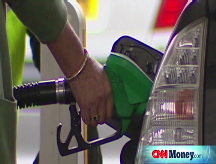Oil prices wobble as demand wanes
Crude prices zig-zag on fresh signs of slumping demand, a stronger dollar, and bigger-than-expected drops in inventory supplies after Gustav.

NEW YORK (CNNMoney.com) -- Oil prices eased Wednesday - ending at a 5-month low - as heightened worries over slumping demand and a stronger dollar offset a weekly government report showing a bigger-than-expected decline in gasoline and crude inventories.
By the end of trading in New York, U.S. light sweet crude for October delivery had settled down 68 cents to $102.58 a barrel, the lowest closing price since April 1.
Earlier in the day, OPEC moved to reduce output levels. And while Hurricane Ike did not look likely to damage Gulf of Mexico production rigs, market watchers were monitoring the storm as it was upgraded to a Category 2 hurricane Wednesday afternoon.
However, "the market is transfixed on weaker demand," said Andrew Lebow, a broker at MF Global in New York, and so supply news didn't boost oil prices.
Another analyst echoed the sentiment. "The falling demand is offsetting all supply news," said James Cordier, portfolio manager at OptionSellers.com.
A stronger dollar also weighed on prices. Oil is traded in U.S. currency around the world and so when the greenback gains, the price of oil falls.
The market would typically rally after a larger-than-expected decline in oil inventories. "The dollar's strength and the expectations that demand is falling overshadows times 10 the fact that we had supply numbers that on the surface should be bullish," said Cordier.
Supply report: In its weekly inventory report, the Energy Information Administration said crude stockpiles dropped by 5.9 million barrels in the week ended Sept. 5. Analysts were looking for a decrease of 3.9 million barrels according to a consensus estimate by Platts, a global energy information provider.
Analysts were prepared for a large drop in inventories after Hurricane Gustav hit Louisiana on Labor Day, shuttering production facilities. As of Wednesday, 77.5% of crude oil production and 64.8% of natural gas production in the Gulf of Mexico remained down, according to the Department of Energy.
At 298 million barrels, crude inventories were in the lower half of the average range for this time of year.
Gasoline supplies fell by 6.5 million barrels and were below average. Analysts were looking for a drop in gasoline stockpiles by 4.7 million barrels last week.
Gas prices have come off recent highs, but continue to be relatively expensive pushing drivers to cut back on miles on the road. Over the last four weeks, gasoline demand averaged 9.3 million barrels per day, which is 2.1% lower than the same period last year, according to the report.
Refineries - which process crude oil into gasoline and other products - operated at only 78.3% of their capacity last week. That was sharply lower than normal, but analysts were only expecting refineries to have operated at 74.2% of capacity last week. The torrential rains and strong winds of Gustav put refineries out of commission for a large portion of the week.
Distillates, used to make heating oil and diesel fuel, declined by 1.2 million barrels, and were in the middle of the average range for this time of year. Analysts were looking for a drop in distillates supplies by 2.3 million barrels.
International demand: In yet another indication of slumping global demand for oil, the International Energy Agency lowered its global energy demand forecast for both 2008 and 2009.
World demand will average 86.8 million barrels per day in 2008, according to IEA's Oil Market Report, released Wednesday. That's 100,000 barrels a day lower than IEA's last estimate. In 2009, the IEA estimates global demand will average 87.6 million barrels per day, or 140,000 barrels a day lower than in the previous report.
"The market's focus is really on softening demand," said Flynn. And the report from IEA fueled the concern, he said.
OPEC: The Organization of the Petroleum Exporting Countries announced early Wednesday that it will return to oil production levels from last September, about 28.8 million barrels of oil per day.
The announcement means that the cartel will be reducing oil allotments by roughly 520,000 barrels per day, because member countries often break the contract and produce more oil than they are allotted. The group met in Vienna, Austria.
In a statement, the cartel said the oil market was oversupplied. OPEC "has ensured that the oil market is well supplied and has enabled inventories to be built up to comfortable levels in terms of forward demand cover," the conference statement said.
Crude prices have fallen sharply from the record-high of $147.27 a barrel, set July 11. OPEC leaders said oil prices had dropped off because the "weakening world economy" had crippled demand. "Higher crude supply, a strengthening of the dollar and an easing of geopolitical tensions" contributed to the erosion of oil prices, said the cartel.
But at least one analyst voiced dismay over OPEC's announcement, calling the decision "short-sighted."
"The reason why the economy is hurting is that oil prices are too high. That is a major reason, and [OPEC] is causing more pain," said Phil Flynn, senior market analyst at Alaron Trading.
Another analyst said the markets didn't really react to the OPEC news because Saudi Arabia stayed mum.
The majority of OPEC's overproduction comes from Saudi Arabia, therefore "to get the cut they are talking about of a half million barrels a day," said Lebow, "you are really going to need Saudi Arabia [and] you did not see the Saudi Arabia oil minister come out and say that he is going to reduce production."
Storms in the Gulf: Even as the Gulf was recovering from Gustav, Hurricane Ike threatened to hit oil production facilities again. Ike was upgraded to a Category 2 Hurricane on Wednesday afternoon.
The National Hurricane Center said that it expected Ike to continue moving through the Gulf of Mexico over the next couple of days. In its most recent public advisory, the Center also said "Ike is expected to become a major hurricane during the next 24 hours."
In preparation for Ike, oil companies stopped any re-boarding of offshore facilities following Gustav, according to a statement by the Minerals Management Service.
Shell has already evacuated 193 offshore personnel, according to a statement on their Web site. The company planned on completing the final 47 evacuations on Wednesday.
In addition, BHP Billiton evacuated all nonessential employees from the Gulf and shut down production at its facility off the coast of Louisiana, according to a company spokesperson.
The oil market has to take workers off the rigs in order to protect their safety, but "the hope is that if there is not much damage and there are not more storms behind (Ike), they can bring that production back online pretty quickly," said Flynn. ![]()





